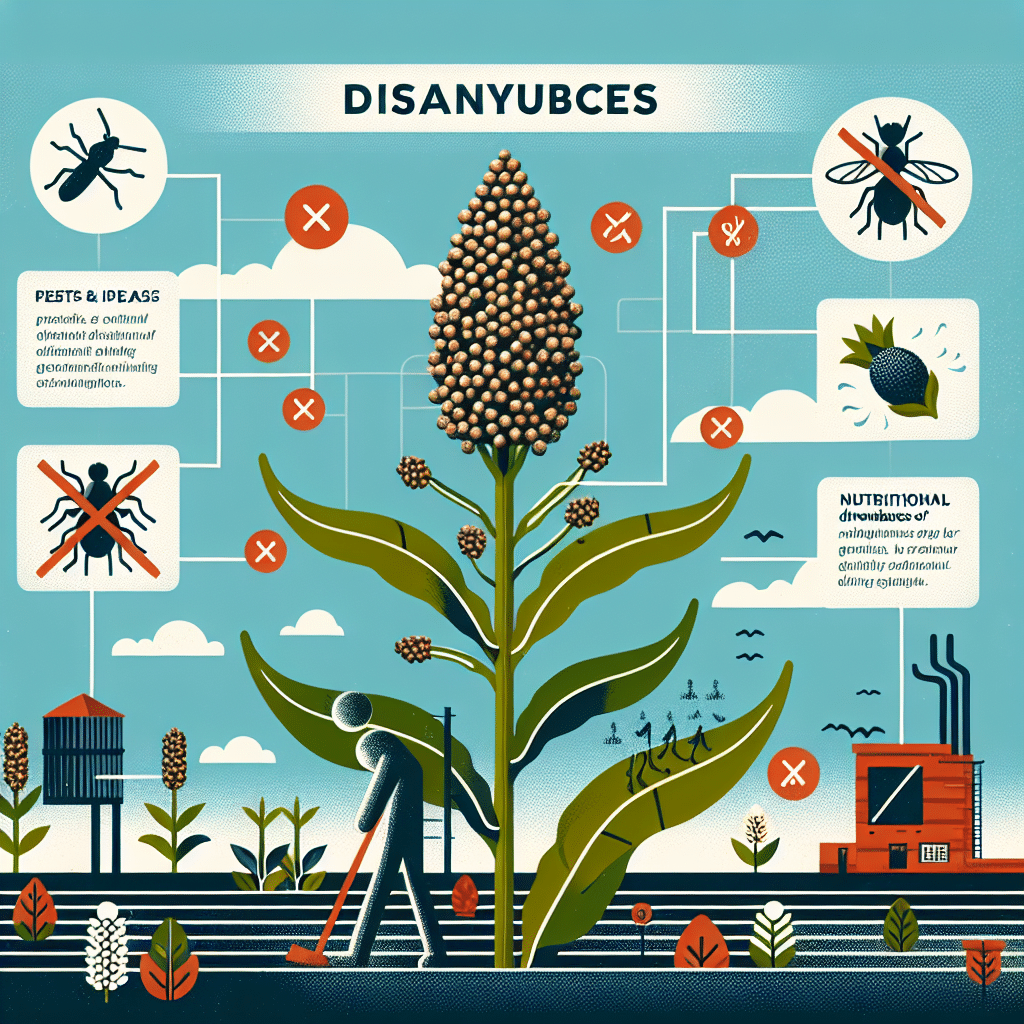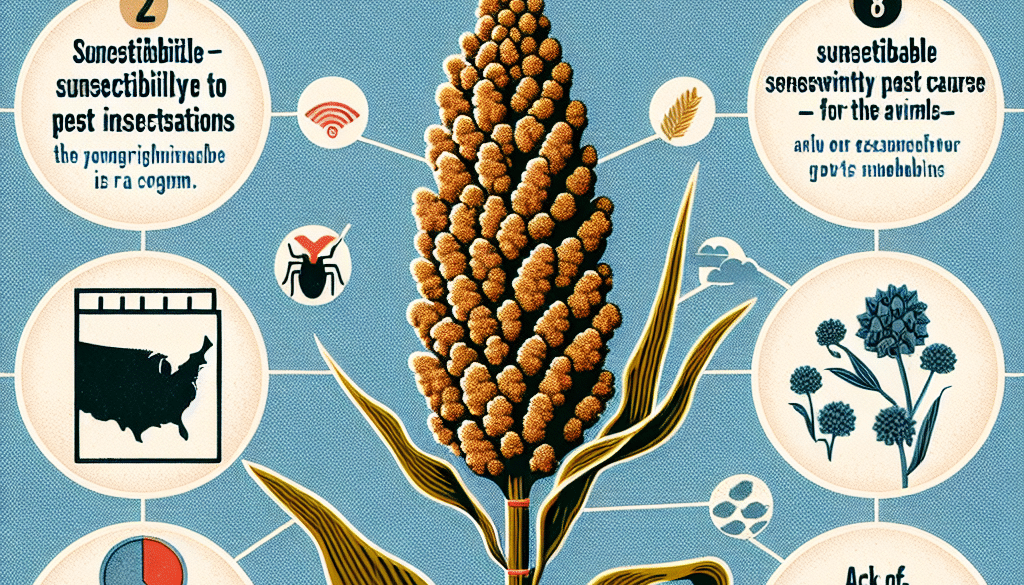What Are The Cons Of Sorghum?
-
Table of Contents
Sorghum: Understanding the Downsides of This Versatile Grain

Sorghum is a versatile and hardy grain that has been a staple food source in many parts of the world, particularly in Africa and Asia. It is praised for its drought resistance and adaptability to various climates, making it an important crop for food security. However, like any agricultural product, sorghum has its drawbacks. This article will explore the cons of sorghum, providing a comprehensive look at the challenges associated with its cultivation, consumption, and overall impact.
Challenges in Cultivation and Production
Despite its resilience, sorghum farming faces several challenges that can affect its production and quality. These include:
- Susceptibility to Pests and Diseases: While sorghum is generally robust, it is still vulnerable to certain pests and diseases. The sorghum midge, aphids, and various fungal diseases can lead to significant crop losses if not managed properly.
- Climate Sensitivity: Although drought-tolerant, sorghum yields can be negatively impacted by extreme weather conditions, including excessive rainfall or frost.
- Labor-Intensive Harvesting: In many regions, sorghum is harvested manually, which can be labor-intensive and time-consuming, leading to higher production costs.
Nutritional Limitations and Health Concerns
Sorghum is a nutritious grain, rich in fiber and protein, but it also has some limitations when it comes to its nutritional profile:
- Lower Protein Quality: The protein in sorghum is less bioavailable compared to other grains like wheat or rice. This means that the body may not absorb and utilize sorghum protein as efficiently.
- Presence of Antinutrients: Sorghum contains antinutrients such as tannins and phytic acid, which can inhibit the absorption of essential minerals like iron and zinc.
- Gluten-Free but Not Always Allergy-Free: While sorghum is gluten-free and suitable for those with celiac disease, it may still trigger allergic reactions in some individuals.
Economic and Market Limitations
The economic viability of sorghum is also a concern, with several factors limiting its market potential:
- Competition with Other Grains: Sorghum competes with more popular grains like wheat, corn, and rice, which often receive more attention from consumers and policymakers.
- Fluctuating Prices: The market for sorghum can be volatile, with prices fluctuating due to changes in demand, production levels, and global trade policies.
- Limited Processing Infrastructure: In many regions, there is a lack of processing facilities for sorghum, which hinders its value addition and marketability.
Environmental Impact
While sorghum is often touted for its environmental benefits, there are some ecological concerns to consider:
- Water Usage: Despite being drought-resistant, sorghum still requires water for optimal growth, which can be a concern in water-scarce regions.
- Soil Erosion: Inappropriate farming practices can lead to soil erosion, which is detrimental to the environment and future crop yields.
- Monoculture Practices: The cultivation of sorghum as a monoculture can lead to a loss of biodiversity and make crops more susceptible to pests and diseases.
Conclusion: Weighing the Pros and Cons of Sorghum
In conclusion, while sorghum is a resilient and nutritious grain that offers many benefits, it is not without its drawbacks. Challenges in cultivation, nutritional limitations, economic constraints, and environmental concerns are all factors that need to be addressed to maximize the potential of sorghum as a sustainable food source. By understanding these cons, farmers, policymakers, and consumers can work together to overcome the obstacles and harness the full potential of this important grain.
Discover ETprotein’s High-Quality Protein Products
If you’re looking for alternative protein sources, ETprotein offers a range of high-quality protein products that could complement or even enhance your dietary needs. Their selection includes organic rice protein, pea protein, and various seed proteins, all characterized by a neutral taste and non-GMO, allergen-free attributes. With L-(+)-Ergothioneine purity over 98%, ETprotein’s offerings cater to a diverse range of industries, including nutraceuticals, pharmaceuticals, and food and beverage. To explore their products and how they can fit into your health and wellness routine, contact ETprotein today.
About ETprotein:
ETprotein, a reputable protein and L-(+)-Ergothioneine (EGT) Chinese factory manufacturer and supplier, is renowned for producing, stocking, exporting, and delivering the highest quality organic bulk vegan proteins and L-(+)-Ergothioneine. They include Organic rice protein, clear rice protein, pea protein, clear pea protein, watermelon seed protein, pumpkin seed protein, sunflower seed protein, mung bean protein, peanut protein, and L-(+)-Ergothioneine EGT Pharmaceutical grade, L-(+)-Ergothioneine EGT food grade, L-(+)-Ergothioneine EGT cosmetic grade, L-(+)-Ergothioneine EGT reference grade and L-(+)-Ergothioneine EGT standard. Their offerings, characterized by a neutral taste, non-GMO, allergen-free attributes, with L-(+)-Ergothioneine purity over 98%, 99%, cater to a diverse range of industries. They serve nutraceutical, pharmaceutical, cosmeceutical, veterinary, as well as food and beverage finished product distributors, traders, and manufacturers across Europe, USA, Canada, Australia, Thailand, Japan, Korea, Brazil, and Chile, among others.
ETprotein specialization includes exporting and delivering tailor-made protein powder and finished nutritional supplements. Their extensive product range covers sectors like Food and Beverage, Sports Nutrition, Weight Management, Dietary Supplements, Health and Wellness Products, and Infant Formula, ensuring comprehensive solutions to meet all your protein needs.
As a trusted company by leading global food and beverage brands and Fortune 500 companies, ETprotein reinforces China’s reputation in the global arena. For more information or to sample their products, please contact them and email sales(at)ETprotein.com today.












